Vous êtes à la section Le Rwanda
Le Rwanda
Rwanda, also known as the "Land of a Thousand Hills" or even the "Land of Ten Thousand Hills," is a country located in East Africa. It is situated approximately 4 degrees south of the equator and has an average altitude of 1,500 meters, making it one of the highest countries in the world.
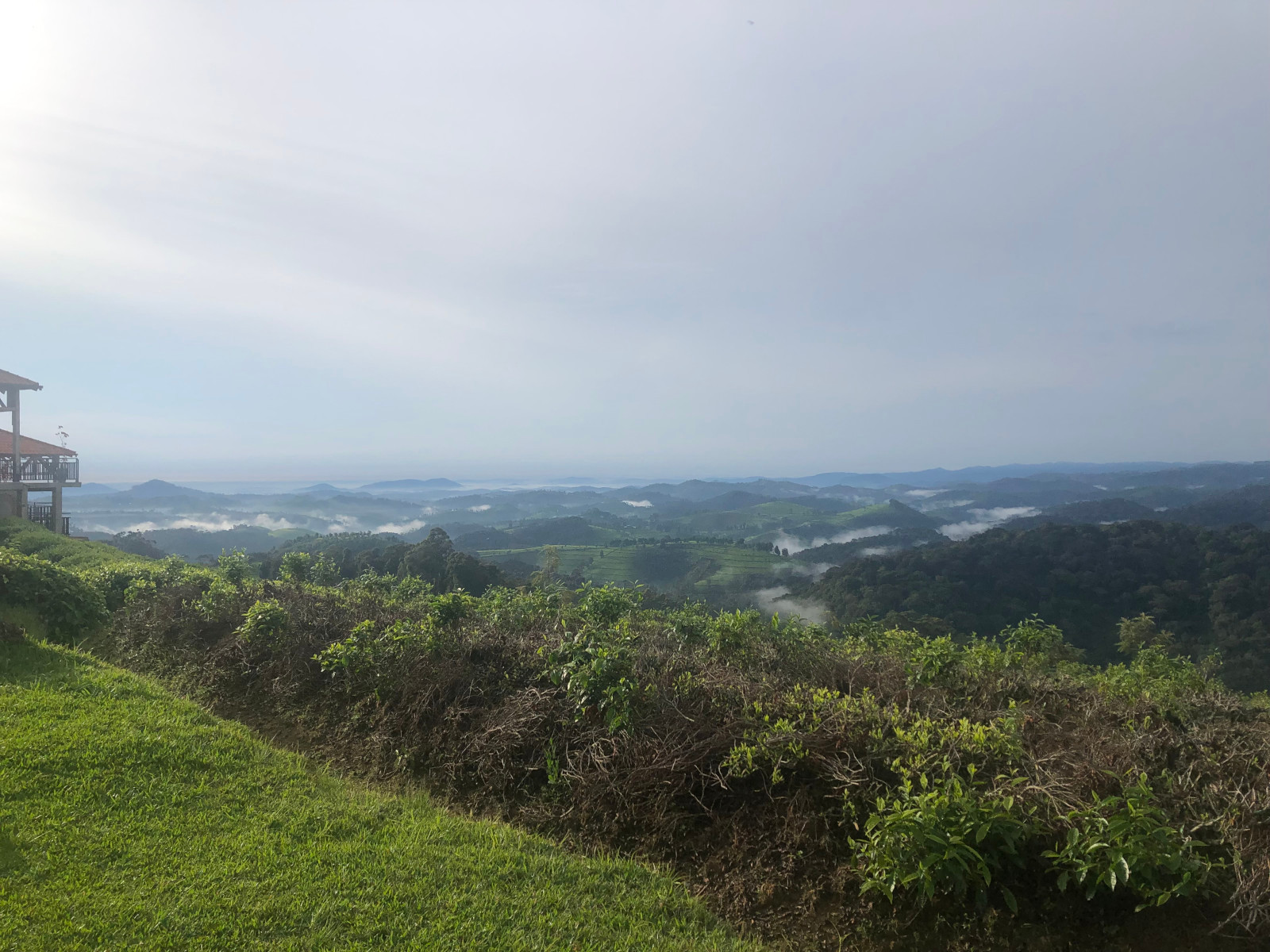

In the northwest, you can find the Volcanoes National Park (Virunga) in Rwanda, home to five majestic volcanoes: Karisimbi, Visoke, Muhabura, Gahinga, and Sabyinyo. Among them, Karisimbi stands as the tallest, reaching an impressive altitude of 4,507 meters.
Rwanda is a landlocked country, bordered by Uganda to the north, Tanzania to the east, the Democratic Republic of the Congo (DRC) to the west, and Burundi to the south. Its geographical location places it at the heart of East Africa, surrounded by diverse and neighboring nations.
In the west, you can find Lake Kivu, which borders the Democratic Republic of the Congo (DRC).

For hiking and trekking enthusiasts, Rwanda is a must-visit destination with its breathtaking landscapes and picturesque hills.
An interesting anecdote is that moss grows on trees both in the north and south, so one should not rely on moss to determine their direction.
The climate of Rwanda is considered temperate, with temperatures ranging from 17°C to 32°C throughout the year. There are two rainy seasons, a small one and a big one. The small rainy season starts in September and ends in November. However, it is rare to have consecutive rainy days for several days. There are also two dry seasons: the small dry season that starts in December and ends in mid-March, and the big dry season that starts in June and ends in August. It doesn't rain for several weeks.
Rwanda has four different climates. In the north, the climate is rather cool and humid. In the east, the climate is hot and dry, even very dry during the dry season. In the south, the climate is temperate with significant drought peaks during the dry season. In the west, the climate is temperate without water stress.
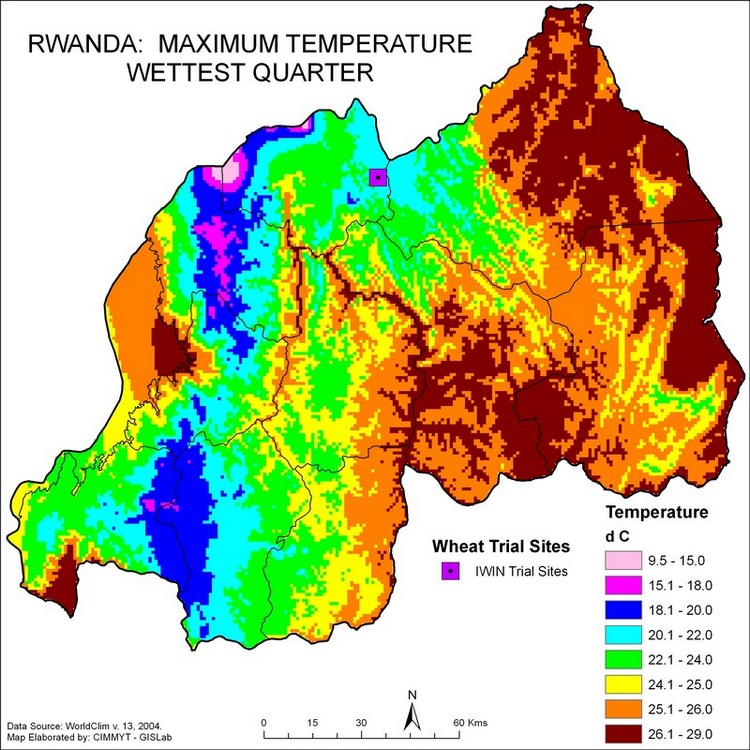
Rwanda is divided into 5 provinces: The Eastern Province in pink, the Southern Province in blue, the Western Province in orange, the Northern Province in yellow, and the Kigali Province in turquoise.

Rwanda is a very small country in terms of its land area, making it one of the countries with the highest population density per square kilometer (501 inhabitants/km²). As of August 2022, it had a population of 13,246,394.
Rwanda is a member of both the Francophonie and the Commonwealth.
There are four official languages in Rwanda: Kinyarwanda, Swahili, English, and French. A large portion of the population is bilingual or even trilingual. Rwandans have a great aptitude for language learning.
Rwanda has become a highly sought-after destination in East Africa for business and international summits. The population is very welcoming, and the country has high levels of security. People can safely go out at any time of day or night. Corruption is almost non-existent, making it a highly attractive country for tourism and business. It only takes 20 minutes to register a business online.
Moreover, Rwanda is known for its cleanliness and effective nature protection policies. It was the first country to ban single-use plastic bags and imposes heavy taxes on plastics that can be replaced with eco-friendly materials. The country faces challenges with soil erosion and actively organizes campaigns for planting fruit trees. The organization "Les Ateliers Ouverts" contributes to these efforts. To learn more, click here.
The capital city is Kigali, but Rwanda also has six satellite cities with similar infrastructure and funding, which helps mitigate rural exodus to some extent. These satellite cities include:
-
Bugesera, located in the southern part of the Eastern Province.
-
Nyagatare, situated in the northern part of the Eastern Province.
-
Huye, in the Southern Province.
-
Muzanze, in the Northern Province, bordering the Democratic Republic of Congo (DRC).
-
Rubavu, located in the northern part of the Western Province.
-
Rusizi, situated in the southern part of the Western Province.
Bugesera
Bugesera is one of the seven districts in the Eastern Province. Known for its natural beauty and rich cultural heritage, Bugesera offers a unique experience to all who visit.
In addition to its natural beauty, Bugesera is also renowned for its rich history and vibrant culture. The people of Bugesera are known for their warm welcome and hospitality, providing visitors with an authentic and immersive experience.
Bugesera is famous for its traditional craftsmanship, including weaving, sculptures, and pottery. Visitors have the opportunity to explore and purchase these unique handmade creations, showcasing the talent and craftsmanship of local artisans.
Bugesera and its region are also known for their delicious cuisine. Traditional Rwandan dishes such as isombe (cooked cassava leaves), ubugali (cornmeal), and ibitoke (plantains) are integral parts of Bugesera's culinary culture. Visitors can savor these authentic dishes and discover the unique flavors of the region.
With the upcoming new international airport, scheduled to open its doors by 2024, Bugesera is gradually becoming an essential commercial and tourist hub in Rwanda and East Africa as a whole.
Nyagatare
Nyagatare is renowned for its flourishing agriculture. The region is known for its vast farmlands where various crops are grown, including cereals, vegetables, and fruits. Visitors have the opportunity to discover traditional farming practices, participate in harvesting activities, and taste fresh products directly from the farm.
Nature enthusiasts and hikers can explore picturesque trails and the beautiful landscapes of the region. The local fauna and flora are rich and diverse, providing nature lovers with a unique opportunity to observe unique animal and plant species.
Nyagatare is also known for its lively market, where visitors can discover and purchase local handicrafts, traditional clothing, and unique souvenirs. It is the perfect place to immerse oneself in the daily life of the local population and experience the authenticity of Nyagatare's culture.
Huye
Huye, formerly known as Butare, is located 100 km from Kigali and is the second largest city in the country.
Huye, situated in southern Rwanda, is a fascinating and vibrant city that offers visitors an unforgettable cultural, educational, and natural experience. Known for its historical heritage, renowned arboretum, ethnographic museum, and natural park, Huye is a comprehensive destination that caters to all types of travelers.
The Huye Arboretum is a true natural gem. With its shaded trails, this place offers a peaceful getaway in the heart of the city. The arboretum is home to an impressive collection of indigenous trees and plants, allowing visitors to explore Rwanda's botanical diversity. Leisurely walks through the green alleys provide a relaxing atmosphere and a chance to connect with the surrounding nature.
The Huye Ethnographic Museum is a window into Rwanda's culture and history. Through its captivating exhibitions and authentic artifacts, the museum allows visitors to immerse themselves in the traditions, customs, and way of life of the country's different ethnic groups. Craft objects, traditional costumes, musical instruments, and ritual items are displayed, offering a fascinating glimpse into Rwanda's cultural heritage.
Nyungwe National Park is located 30 km from the city of Huye and is another must-visit attraction for nature lovers. Nestled amidst picturesque landscapes, this park offers magnificent hiking trails, allowing visitors to explore the natural beauty of the region. Breathtaking panoramas, impressive rock formations, and diverse flora and fauna make the national park a true paradise for outdoor enthusiasts.
Huye is also recognized as an important educational center in Rwanda, housing the University of Rwanda and several other higher education institutions. This concentration of academic institutions makes it a hub of knowledge and learning, attracting students and researchers from around the world.
Muzanze
The Volcanoes National Park, home to mountain gorillas, is located in the Muzanze region. It is an extraordinary natural sanctuary where visitors have the chance to encounter these incredible animals up close. The park offers unique trekking experiences to observe gorillas in their natural habitat, making it an unforgettable and moving moment for visitors.
Muzanze is home to the former site of Diane Fossey, the famous primatologist and advocate for mountain gorillas. Diane Fossey dedicated much of her life to studying and protecting mountain gorillas in the Muzanze region of Rwanda. Her pioneering work helped raise awareness about the importance of conserving this endangered species.
Every year in Muzanze, the Gorilla Naming Ceremony takes place. It is a ceremony where photos of the newborn gorillas of the year are presented, and international personalities assign them names. The entire population is invited to attend, and entry is free. Each person is provided with a meal and a drink, and a concert with Rwandan stars is organized. It is a national event with international significance.
In addition to the allure of the gorilla park, the Muzanze region is home to the majestic chain of volcanoes, offering exceptional natural beauty. It is surrounded by breathtaking mountainous landscapes, majestic volcanoes, and lush forests. Outdoor enthusiasts can enjoy hiking, climbing, bird watching, and many other activities in harmony with nature.
Rubavu
In addition to its academic excellence, the city of Rubavu and its surroundings also offer an exceptional natural setting. Rubavu is located on the shores of the magnificent Lake Kivu, providing breathtaking landscapes and a peaceful atmosphere conducive to learning and personal growth. Visitors have the opportunity to enjoy the surrounding natural beauty and engage in various outdoor activities such as hiking, water sports, and exploring the local wildlife and flora.
Rubavu is also known for hosting a part of the Volcanoes National Park, a renowned nature reserve famous for its diverse wildlife and ecosystem conservation. This park offers visitors the opportunity to discover an incredible wealth of biodiversity and participate in hiking activities.
Furthermore, Rubavu offers a variety of tourist attractions, including beautiful sandy beaches, natural hot springs, and historical sites.
Rusizi
The city of Rusizi is a captivating destination located in the Western Province of Rwanda. Nestled on the picturesque shores of Lake Kivu, Rusizi offers visitors a unique combination of natural beauty, history, and culture.
One of the major attractions of Rusizi is Lake Kivu itself. With its sparkling waters and spectacular landscapes, Lake Kivu is a paradise for nature lovers and water sports enthusiasts. Visitors can enjoy swimming, kayaking, sailing, and even fishing while admiring the magnificent surrounding panoramas.
In addition to its enchanting natural setting, Rusizi also boasts a rich cultural heritage. The city is home to the Rusizi National Museum, where visitors can explore the history and culture of Rwanda through fascinating exhibits. The museum showcases traditional artifacts, artworks, photographs, and historical documents, offering a profound insight into the country's identity and evolution.
Another cultural gem in Rusizi is the Kigali Palace, an important historical site. This palace was once the residence of the King of Rwanda and has now been transformed into a museum that traces the royal history and the significance of monarchy in the region. Visitors can explore the different rooms of the palace, discover royal artifacts, and learn more about the lives of Rwandan kings and queens.
Infrastructure
Rwanda is experiencing a rapid and remarkable expansion, with a swift development of its infrastructure. The infrastructure is highly developed, with 3G coverage available throughout the country, including the most remote rural regions. 4G is also widely accessible, even in rural areas. Furthermore, fiber optic is present in all cities, and its deployment is underway in rural areas.
The roads are in excellent condition and receive regular maintenance. Extensive road networks are currently under construction, progressing at an extremely fast pace. For instance, the construction of the road leading to the new airport was completed within just 6 months, covering a distance of 63 km. In April 2022, this road was still unpaved and without lighting, and by June 2022, it was completely asphalted with installed lighting. By December 2022, the works were completed.
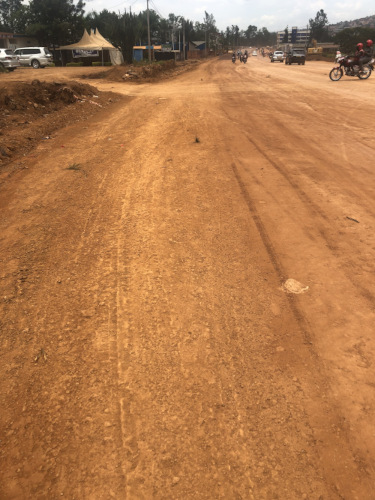
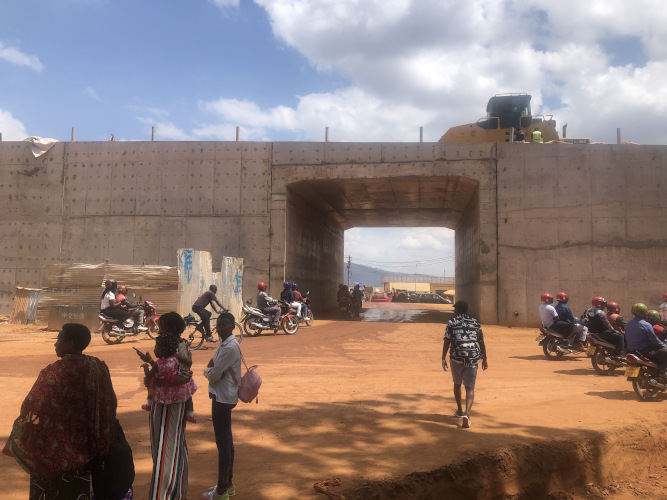


The most common mode of transportation in Rwanda is motorcycle taxis, which can take you wherever you need to go, even in areas inaccessible by car. Motorcycle taxis are found throughout the country, including in rural areas.

Public transportation is available nationwide. There are bus shuttles that operate between Kigali and all provinces, with departures every hour from 6:30 am to 8:00 pm, seven days a week. The stops are based on passenger demand. These bus shuttles also serve as a delivery system, where they pick up packages at the starting point and the recipients collect them at the bus stop. This shuttle system allows for affordable travel across the country without needing a car.
There is a bus network in place in Kigali and satellite cities, with schedules varying depending on the city.
In the future, there are plans to construct a railway line that will connect Kigali to Congo Brazaville.
The healthcare system in Rwanda is exemplary, reflecting the unwavering commitment of the government to the well-being of its citizens. Throughout the country, there is a dedicated health post in every village, while each district has its own hospital. These health posts provide emergency first aid, as well as screenings for malaria and HIV. Furthermore, they closely monitor the health and well-being of pregnant women and children.

(Health post Ruhango Rwanda)
Pregnant women are required to have a mandatory monthly visit, but the care doesn't stop there. If a woman misses a visit, a dedicated member of the health post goes to her home to ensure she is not facing any difficulties and is receiving proper nutrition. Infants are also taken care of with monthly visits until they start school. Even after that, health post staff continue to visit nursery schools to check on the children's health, conducting regular measurements and weight assessments.

(Kibagabaga hospital)
Rwanda is at the forefront of medical innovation with its drone delivery service for medicines and blood products. This fast and efficient solution ensures quick supply to remote hospitals and health posts, guaranteeing access to essential treatments.
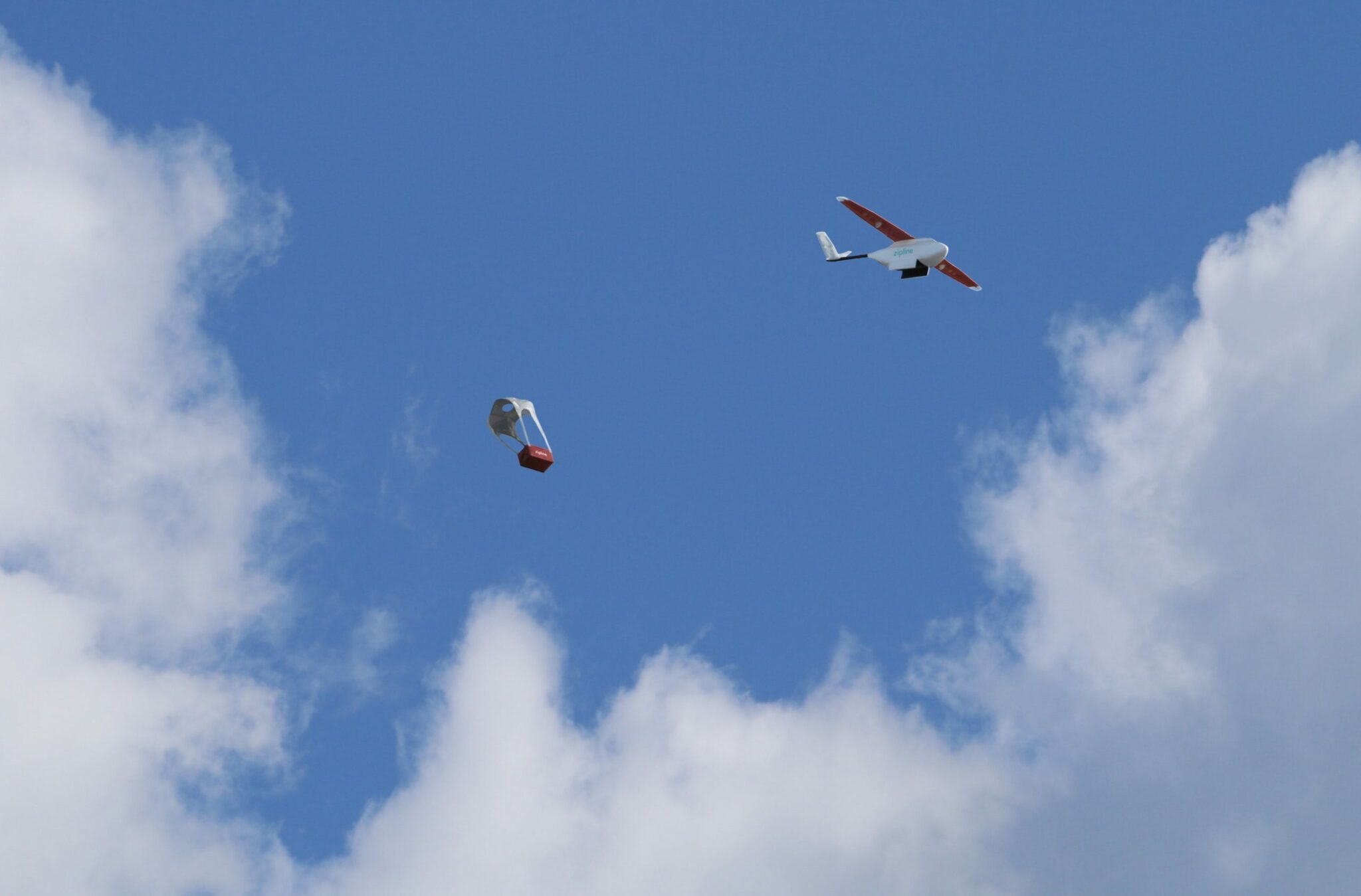
(drone delivery)
In urban areas, pharmacies are abundant, often lining the streets, offering a wide range of medications, from aspirin to antiretroviral treatments for HIV.
To ensure comprehensive healthcare coverage, Rwandan men and women benefit from affordable health insurance, with an annual cost of only 3000 RWF (approximately $2.80) per household.
In collaboration with France, Rwanda has distinguished itself as the first country to perform remote surgical operations using augmented reality, showcasing its willingness to embrace the latest technological advancements in healthcare.

 LES ATELIERS OUVERTS (Rwanda)
LES ATELIERS OUVERTS (Rwanda) 

